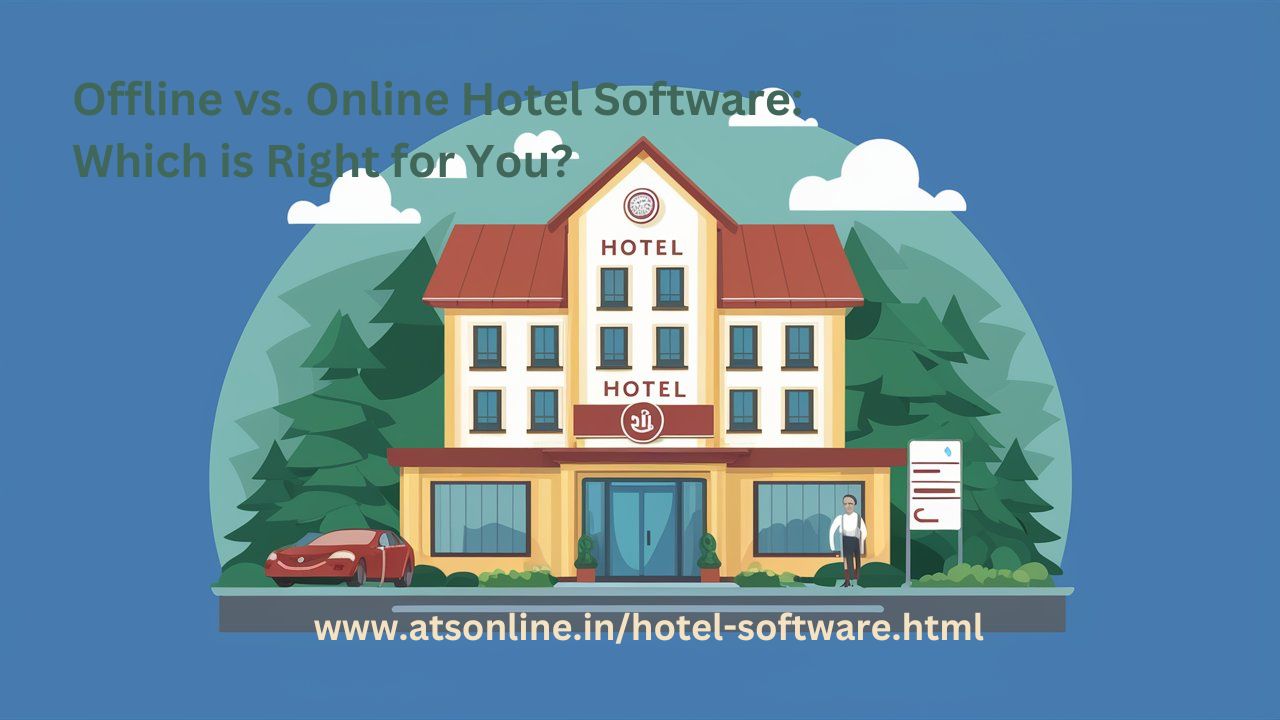Discover the pros and cons of offline vs. online hotel software. Learn which is best for your hotel based on factors like budget, internet reliability, data security, and operational needs. Make an informed decision to enhance your hotel’s efficiency and guest experience.
Choosing the right hotel management software is crucial for any hotel business, whether a small boutique or a large chain. With technology evolving rapidly, hoteliers are faced with a pivotal decision: should they opt for offline or online hotel software? Each option has its benefits and drawbacks, and the right choice depends on various factors including the size of the hotel, budget, operational needs, and future growth plans. This blog will delve into the key aspects of both offline and online hotel software to help you determine which is right for you.
Understanding Offline Hotel Software
What is Offline Hotel Software?
Offline hotel software, also known as on-premises or locally-installed software, is installed directly onto the hotel’s local servers and computers. This means the data and applications are stored and managed on-site.
Advantages of Offline Hotel Software
- Data Security and Control
- With offline software, all the hotel’s data is stored locally. This gives the hotel complete control over its data security, as it is not reliant on external servers or internet connections.
- Sensitive information is less vulnerable to cyber-attacks that target cloud-based systems.
- Dependability on Internet Connectivity
- Offline software does not depend on internet connectivity to function. This is particularly beneficial in areas with unreliable or slow internet services.
- Customization and Integration
- Hotels can often customize offline software to fit their specific needs better.
- Integration with other existing systems within the hotel is typically more seamless.
Disadvantages of Offline Hotel Software
- High Initial Costs
- The initial setup and installation of offline software can be costly, requiring significant investment in hardware and infrastructure.
- Ongoing maintenance and upgrades also add to the costs.
- Limited Accessibility
- Accessing the system remotely is challenging, as the software is tied to the physical location of the hotel’s servers.
- Maintenance and Updates
- Hotels are responsible for maintaining the software and keeping it updated, which requires technical expertise and additional resources.
Understanding Online Hotel Software
What is Online Hotel Software?
Online hotel software, also known as cloud-based or Software as a Service (SaaS), is hosted on remote servers and accessed via the internet. This means data is stored off-site and can be accessed from anywhere with an internet connection.
Advantages of Online Hotel Software
- Accessibility and Flexibility
- Online software can be accessed from any device with an internet connection, providing greater flexibility for hotel staff and management.
- This is particularly beneficial for chains with multiple locations or for staff who need to work remotely.
- Lower Initial Costs
- There are generally lower upfront costs as the software is subscription-based, and the need for extensive on-site hardware is reduced.
- Updates and maintenance are handled by the service provider, reducing the burden on the hotel’s IT resources.
- Scalability
- Cloud-based solutions can easily scale up or down based on the hotel’s needs, making them suitable for both small hotels and large chains.
- Adding new features or integrating with other systems is usually straightforward.
Disadvantages of Online Hotel Software
- Dependence on Internet Connectivity
- Online software requires a reliable internet connection. Any disruptions can impact the hotel’s operations.
- Hotels in areas with poor internet infrastructure may face significant challenges.
- Data Security Concerns
- Storing data off-site introduces potential security risks. Hotels must rely on the service provider’s security measures to protect their data.
- Compliance with data protection regulations can also be more complex.
- Ongoing Costs
- While initial costs are lower, subscription fees can add up over time.
- Depending on the pricing model, costs can increase with the addition of new features or users.
Key Considerations When Choosing Between Offline and Online Hotel Software
1. Hotel Size and Scale
- Small Hotels and Boutiques: Smaller establishments may benefit more from online software due to its lower initial costs, ease of use, and flexibility. They may not have the resources to manage the IT infrastructure required for offline software.
- Large Hotels and Chains: Larger hotels with complex operations may prefer offline software for its customization capabilities and control over data security. They often have dedicated IT teams to manage and maintain the system.
2. Budget Constraints
- Initial Investment: If budget is a concern, the lower initial costs of online software might be more appealing. However, it’s important to consider the long-term subscription fees.
- Total Cost of Ownership: Evaluate the total cost of ownership, including installation, maintenance, and ongoing fees. Sometimes, the lower upfront costs of online software can be offset by higher long-term costs.
3. Internet Reliability
- Connectivity Issues: In areas with poor internet connectivity, offline software may be the only viable option. Reliable internet is crucial for the smooth operation of online hotel software.
- Backup Solutions: Even if you choose online software, consider having a robust backup solution to mitigate any internet connectivity issues.
4. Data Security and Compliance
- Data Sensitivity: Hotels handling highly sensitive guest data might prefer offline software to maintain direct control over data security.
- Compliance Requirements: Different regions have varying data protection regulations. Ensure that the chosen software, whether online or offline, complies with local laws.
5. Operational Needs
- Customization: If your hotel has specific operational requirements, offline software might offer better customization options. Ensure the software can be tailored to your needs.
- Scalability: Consider your future growth plans. Online software often provides more scalability, allowing you to easily add new features and expand your operations.
Case Studies
Case Study 1: Boutique Hotel in a Remote Area
A boutique hotel located in a remote area with unreliable internet connectivity chose offline hotel software. The initial setup cost was high, but the hotel valued the data security and operational stability provided by the local server setup. Customization was a crucial factor, as the hotel had unique operational needs. Despite the higher maintenance costs, the hotel was satisfied with its decision due to the dependability and control it offered.
Case Study 2: Urban Hotel Chain
An urban hotel chain with multiple locations opted for online hotel software. The lower initial costs and ease of deployment across various locations were significant advantages. The cloud-based system allowed management to access data from anywhere, facilitating better oversight and decision-making. The hotel chain appreciated the flexibility and scalability of the online solution, which enabled them to quickly adapt to changing market demands and expand their operations without significant IT investment.
Conclusion
Choosing between offline and online hotel software is a critical decision that impacts a hotel’s efficiency, security, and overall guest experience. There is no one-size-fits-all solution, and the right choice depends on your specific circumstances and priorities.
Offline Hotel Software is Best For:
- Hotels in areas with unreliable internet connectivity.
- Establishments that prioritize data security and want complete control over their data.
- Hotels that require highly customized software solutions.
- Larger hotels with the resources to manage and maintain IT infrastructure.
Online Hotel Software is Best For:
- Hotels with reliable internet access.
- Smaller hotels and chains looking for lower initial costs and ease of use.
- Establishments that need flexibility and remote access to their systems.
- Hotels planning to scale their operations quickly and efficiently.
Ultimately, evaluating your hotel’s specific needs, budget, and operational environment will guide you to the right choice. By understanding the advantages and disadvantages of both offline and online hotel software, you can make an informed decision that will support your hotel’s success and growth in the long run.
If you want to learn more about how we can help you manage your Hotel business, please visit our website here. We are always happy to hear from you and answer any questions you may have. You can reach us by phone at +91 9810078010 or by email at ats.fnb@gmail.com. Thank you for your interest in our services.
https://atsonline.in/hotel-software.html
FAQ 1: What is the main difference between offline and online hotel software?
Answer: The main difference lies in how they are hosted and accessed. Offline hotel software is installed locally on the hotel’s servers and does not require an internet connection to operate. In contrast, online hotel software is cloud-based, hosted on remote servers, and accessed via the internet, allowing for remote accessibility and lower upfront costs.
FAQ 2: Which type of hotel software is more cost-effective?
Answer: Online hotel software generally has lower initial costs since it operates on a subscription basis and requires minimal on-site hardware. However, the ongoing subscription fees can add up over time. Offline hotel software involves higher initial costs due to the need for hardware and installation, but it may have lower long-term costs as it usually doesn’t require recurring subscription fees.
FAQ 3: How does internet reliability affect the choice of hotel software?
Answer: Internet reliability is crucial for online hotel software, as it relies on a stable internet connection for all operations. If your hotel is in an area with poor or unreliable internet connectivity, offline hotel software may be more suitable since it does not depend on the internet to function, ensuring uninterrupted operations.
FAQ 4: What are the security implications of using online hotel software?
Answer: Online hotel software stores data on remote servers, which can raise concerns about data security and compliance with data protection regulations. Hotels must rely on the service provider’s security measures. It’s essential to choose a reputable provider with strong security protocols to protect sensitive guest information. Offline hotel software, on the other hand, keeps data on-site, giving hotels more direct control over their data security.
FAQ 5: Can online hotel software be customized to fit specific operational needs?
Answer: Yes, online hotel software often offers a range of customizable features and integrations, making it adaptable to various operational needs. However, the extent of customization might be limited compared to offline software, which can be tailored more extensively to fit specific requirements. When choosing online software, it’s important to ensure it has the necessary flexibility to meet your hotel’s unique needs.




